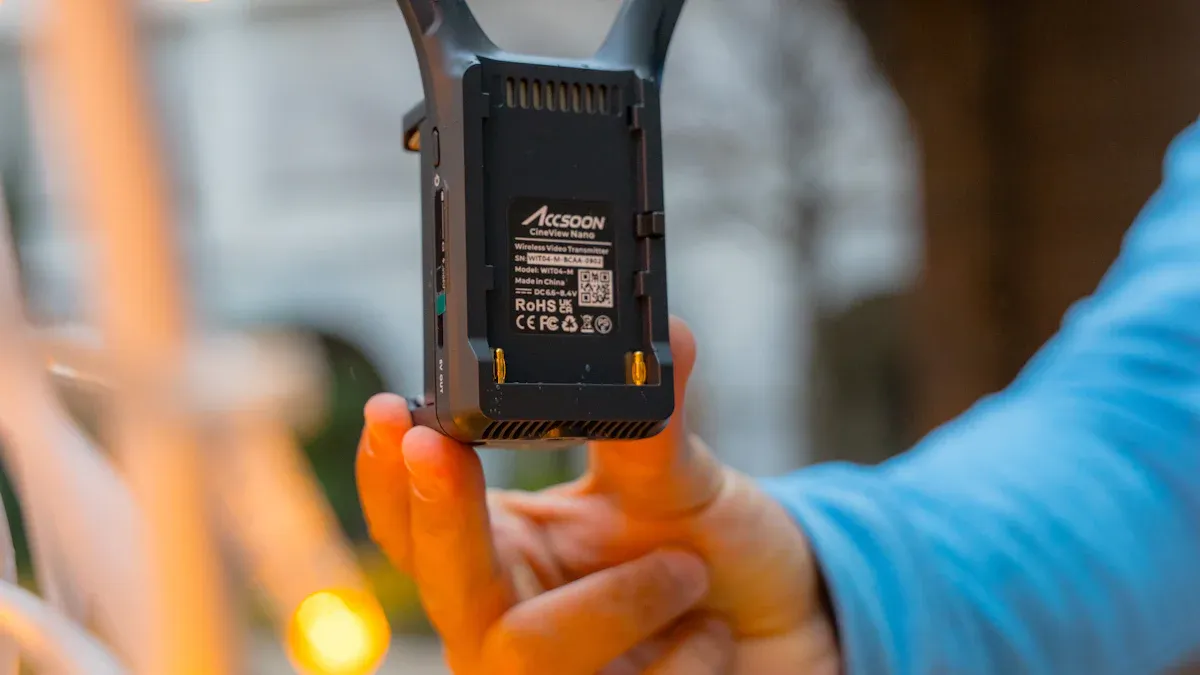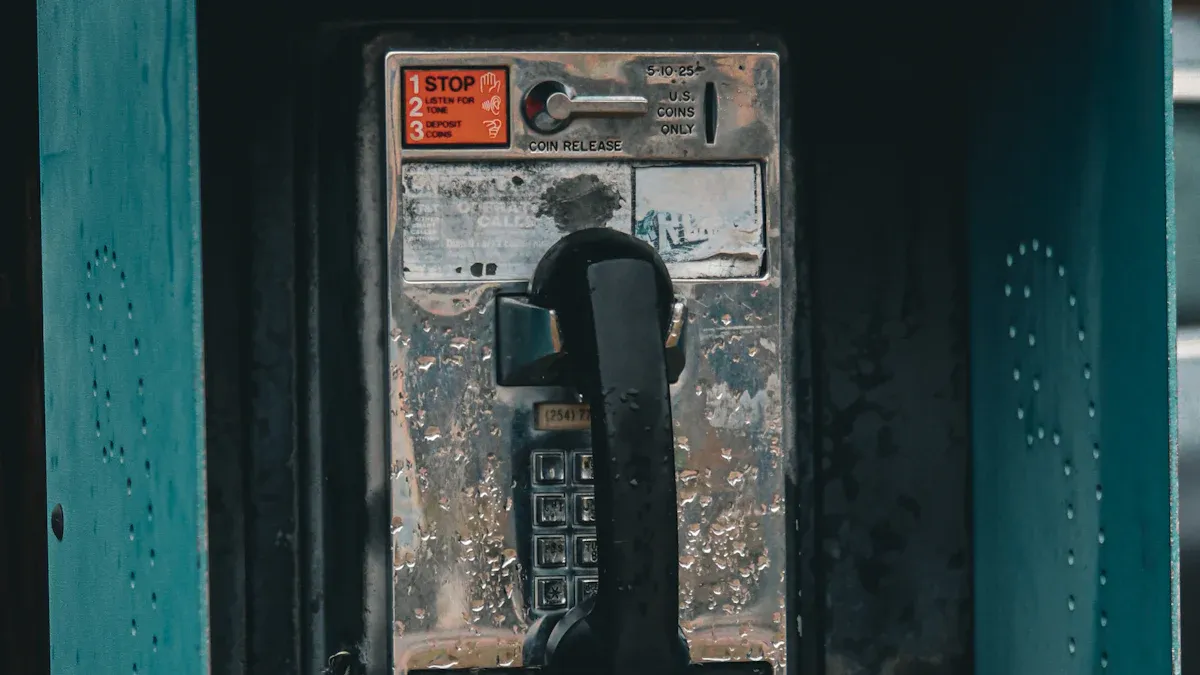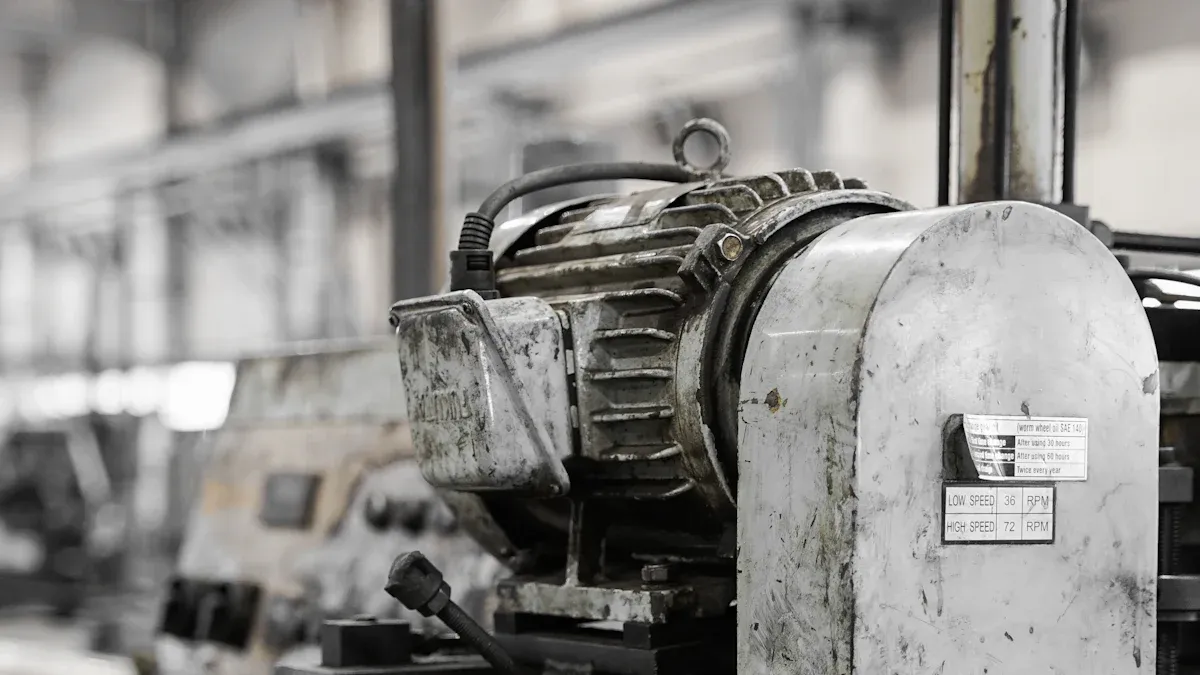
Reliable communication is essential in challenging environments such as factories, mines, or outdoor work zones. An industrial heavy-duty telephone is specifically engineered to withstand these demanding conditions. Choosing the wrong device can result in operational failures, safety hazards, or decreased productivity. Considering options like a waterproof outdoor telephone or an industrial IP telephone guarantees both durability and functionality. In locations where enhanced security is necessary, a public security telephone could be the ideal solution.
Schlüsselmerkmale eines Industrial Heavy-Duty Telefons

Industrial environments demand telephones that can handle extreme conditions while maintaining reliable performance. Let’s explore the key features that make an industrial Heavy Duty telephone stand out.
Durability Standards and Certifications
Durability is non-negotiable for industrial telephones. These devices must meet strict standards to ensure they can withstand harsh conditions. Certifications like IP, NEMA, and MIL-STD-810 are essential indicators of a telephone’s resilience.
| Standard | Description |
|---|---|
| IP Ratings | Measures protection against dust and water. Higher numbers mean better protection. |
| NEMA Ratings | Indicates protection against environmental hazards like corrosion or ice. |
| IK Ratings | Rates impact resistance. Higher numbers mean better durability. |
| MIL-STD-810 | A military standard that tests devices under extreme conditions. |
| UL Approvals | Ensures safety in hazardous locations with flammable materials. |
For example, a telephone with an IP67 rating can resist dust and immersion in water, making it ideal for outdoor or wet environments. Similarly, MIL-STD-810 ensures the device can survive drops, vibrations, and extreme temperatures.
Rugged Build Quality and Materials
The build quality of an industrial Heavy Duty telephone plays a crucial role in its longevity. These telephones often feature reinforced casings made from materials like polycarbonate or stainless steel. Such materials provide resistance to impacts, corrosion, and wear.
Some models, like the Sonim XP8, boast ultra-rugged designs that include water, dust, and impact resistance. These features make them suitable for industries like mining or construction, where equipment faces constant physical stress. Additionally, ergonomic designs ensure ease of use, even when wearing gloves.
Essential Features for Harsh Environments
Industrial telephones must offer features that cater to challenging work settings. Here are some must-have functionalities:
- Battery Life: Long-lasting batteries are critical. Some models provide up to 40 hours of talk time and 575 hours of standby time.
- Audio Performance: HD voice quality and noise cancellation ensure clear communication in noisy environments.
- Security: Features like secure communication protocols protect sensitive information.
- User-Friendly Design: Vibration alarms and large buttons make these phones practical for workers in high-stress environments.
| Feature | Description |
|---|---|
| Battery Life | Up to 40 hours of talk time and 575 hours of standby time. |
| Ruggedness | Can withstand a 3.5m drop and is resistant to spills and splashes. |
| Audio Performance | HD voice quality and noise cancellation for clear communication. |
| Security | Ensures secure communication in industrial settings. |
| User-Friendly | Includes vibration alarms and large buttons for ease of use. |
These features ensure that industrial telephones remain functional and reliable, even in the toughest conditions.
Types of Industrial Heavy-Duty Telephones
Industrial environments vary widely, and so do the telephones designed to meet their demands. Let’s explore three common types of industrial heavy-duty telephones and their unique features.
Weatherproof Models
Weatherproof telephones are built to endure extreme climatic conditions. These models are essential for industries like oil and gas, manufacturing, transportation, and public safety. They ensure uninterrupted communication, even in the harshest environments.
-
Why They’re Needed:
- The oil and gas industry, with over 7,000 oil rigs globally, relies on weatherproof telephones to maintain operations during storms, high humidity, or extreme heat.
- Public safety sectors use these phones to ensure reliable communication during emergencies, regardless of weather conditions.
-
Key Features:
- Sealed enclosures to prevent water and dust ingress.
- Resistance to temperature fluctuations, ensuring functionality in both freezing and scorching conditions.
- Durable materials like stainless steel or reinforced polycarbonate for long-lasting performance.
Weatherproof models are a must-have for outdoor settings where exposure to the elements is unavoidable. They combine durability with reliability, making them a popular choice for tough work environments.
Explosion-Proof Telephones
Explosion-proof telephones are designed for hazardous environments where flammable gases, vapors, or dust are present. These devices prioritize safety by preventing sparks or heat that could ignite an explosion.
| Certification | Description |
|---|---|
| IECEx CSA 23.0034X | Equipment Protection Level |
| Ex eb ib [ib Gb] mb IIC T6/T5 Gb | Safety standard for explosive environments |
| Ex ib [ib Db] tb IIIC T80°C/T95°C Db | Temperature classification for safe operation |
-
How They Work:
- These telephones limit electrical and thermal energy to prevent ignition.
- They comply with strict safety standards like ATEX and IECEx, ensuring safe operation in volatile atmospheres.
-
Steps to Ensure Safety:
- Check for ATEX or IECEx certification.
- Verify that the device minimizes electrical and thermal energy output.
- Confirm the design prevents ignition in hazardous environments.
Explosion-proof telephones are indispensable in industries like chemical plants, oil refineries, and mining operations. Their robust safety features make them a critical component of workplace safety.
Vandal-Resistant Options
In public or high-risk areas, vandal-resistant telephones provide a durable communication solution. These models are built to withstand intentional damage, ensuring they remain operational even in challenging conditions.
-
Key Features:
- Reinforced casings made from materials like stainless steel or aluminum.
- Tamper-proof designs, including secure mounting and concealed wiring.
- Impact-resistant components to handle physical abuse.
-
Where They’re Used:
- Public transportation hubs like train stations or bus terminals.
- Correctional facilities where durability is a top priority.
- Urban areas prone to vandalism or theft.
Vandal-resistant telephones combine strength with functionality, making them ideal for locations where security and reliability are paramount.
Industry-Specific Needs for Industrial Heavy-Duty Telephones

Industrielle Fernsprechapparate are not one-size-fits-all. Different industries face unique challenges, and their communication tools must align with those demands. Let’s explore how these telephones cater to specific sectors.
Telephones for Oil and Gas Industries
The oil and gas sector operates in some of the harshest environments on Earth. Offshore rigs, refineries, and pipelines require telephones that can handle extreme temperatures, high humidity, and potential exposure to corrosive substances. Explosion-proof models are a top choice here. They ensure safety by preventing sparks in areas with flammable gases.
These telephones also feature weatherproof designs to withstand storms and saltwater exposure. For example, a telephone with an IP67 rating can resist water and dust, making it ideal for offshore platforms. Reliable communication in these settings is critical for safety and operational efficiency.
Solutions for Manufacturing and Warehousing
Manufacturing and warehousing environments are bustling with activity. Noise, dust, and heavy machinery are common challenges. Telephones in these settings need to offer noise-canceling audio and rugged designs. Models with large buttons and vibration alerts are particularly useful for workers wearing gloves or operating in noisy areas.
Durability is another key factor. Telephones made from reinforced materials like stainless steel can endure impacts and resist wear over time. These features ensure that communication remains seamless, even in high-stress environments.
Specialized Features for Mining and Construction
Mining and construction sites demand telephones that can handle constant physical stress and extreme conditions. Dust, vibrations, and temperature fluctuations are daily challenges. Industrial heavy-duty telephones designed for these industries often include advanced features like integrated applications for inventory management and procurement.
- Real-World Examples:
- Construction Specialties improved efficiency by automating inventory processes, saving significant time.
- Precision Group reduced approval times for purchase orders by 40%, speeding up transactions.
- ArcelorMittal standardized recruitment processes, enhancing hiring efficiency and reducing time to hire.
These examples highlight how specialized telephones can streamline operations and improve productivity. By combining ruggedness with smart features, these devices become indispensable tools for mining and construction professionals.
Recommended Brands and Models of Industrial Heavy-Duty Telephones
Trusted Brands in the Market
When it comes to industrial telephones, certain brands stand out for their reliability and innovation. These companies have earned trust by consistently delivering durable and high-performing products.
- Guardian Telecom: Known for its rugged designs, Guardian Telecom specializes in telephones for hazardous environments. Their products meet strict safety standards and are built to last.
- Gai-Tronics: This brand offers a wide range of industrial telephones, including weatherproof and explosion-proof models. Their focus on quality and advanced features makes them a favorite in industries like oil and gas.
- Sonim Technologies: Sonim is synonymous with ultra-rugged devices. Their telephones are designed to handle extreme conditions, making them ideal for mining and construction sites.
These brands have proven their ability to meet the demands of tough work settings, ensuring reliable communication when it matters most.
Top Models for Harsh Work Settings
Choosing the right model can make all the difference in challenging environments. Here are some top picks:
- Guardian Telecom T-Series: This weatherproof telephone is perfect for outdoor use. It features a sealed enclosure and corrosion-resistant materials.
- Gai-Tronics RED ALERT® Telephones: Designed for emergency situations, these vandal-resistant models offer durability and clear audio performance.
- Sonim XP8: A smartphone that doubles as an industrial Heavy Duty telephone. It boasts long battery life, noise cancellation, and impact resistance.
Each model addresses specific needs, whether it’s surviving harsh weather, resisting vandalism, or providing advanced features for demanding industries.
Comparing Features, Pricing, and Reliability
Selecting the best telephone involves balancing features, cost, and dependability. Here’s a quick comparison:
| Model | Key Features | Price Range | Reliability |
|---|---|---|---|
| Guardian T-Series | Weatherproof, corrosion-resistant | $$ | High |
| Gai-Tronics RED ALERT® | Vandal-resistant, clear audio | $$$ | Very High |
| Sonim XP8 | Rugged smartphone, long battery life | $$$$ | Exceptional |
Guardian Telecom offers affordable options for outdoor use. Gai-Tronics excels in emergency communication, while Sonim XP8 provides advanced features for tech-savvy industries. Each option delivers reliability tailored to specific needs.
Choosing the right industrial Heavy Duty telephone ensures safety, efficiency, and reliability in tough work environments. Every workplace has unique needs, so evaluating features and certifications is crucial. Workers should focus on durability, compatibility, and industry-specific requirements when making a decision. A well-chosen telephone can make all the difference in challenging conditions.
FAQ
What certifications should I look for in an industrial telephone?
Certifications like IP67, NEMA, and ATEX ensure durability, weather resistance, and safety in hazardous environments. These standards guarantee reliable performance in tough conditions.
How do I choose the right telephone for my industry?
Evaluate your environment. For oil rigs, pick explosion-proof models. For warehouses, choose rugged designs with noise-canceling features. Match features to your specific needs.
Tipp: Always check compatibility with existing systems before purchasing.
Are industrial telephones expensive?
Prices vary. Weatherproof models are affordable, while explosion-proof telephones cost more due to safety features. Compare brands and models to find the best value.
💡 Note: Investing in quality ensures long-term reliability and reduces replacement costs.


